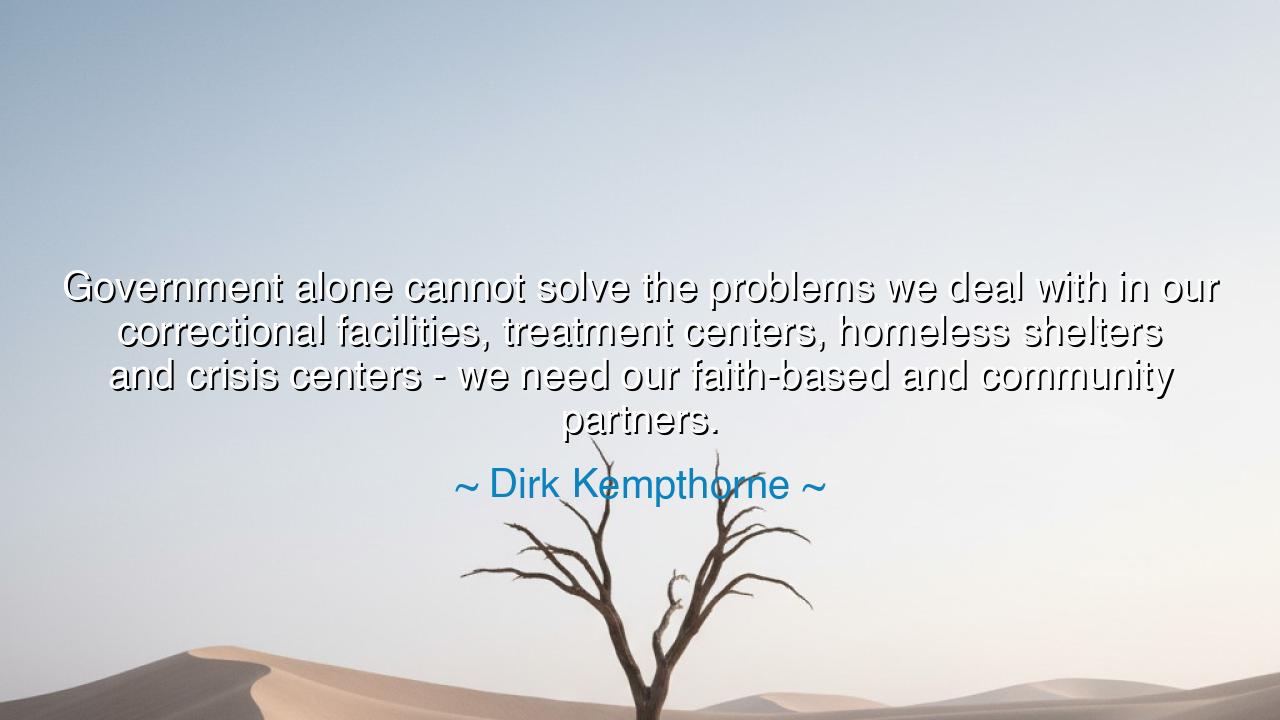
Government alone cannot solve the problems we deal with in our
Government alone cannot solve the problems we deal with in our correctional facilities, treatment centers, homeless shelters and crisis centers - we need our faith-based and community partners.






In the quieter ages of our modern world, when the cities hum with both prosperity and despair, Dirk Kempthorne, a leader who once served his people with earnest purpose, spoke words that strike at the very heart of human duty: “Government alone cannot solve the problems we deal with in our correctional facilities, treatment centers, homeless shelters and crisis centers — we need our faith-based and community partners.” These words, though simple in sound, carry the weight of ancient truth — that the soul of a nation is not sustained by its laws alone, but by the compassion of its people. For no decree, no policy, no law written by man can replace the healing power of human fellowship.
Government, as Kempthorne reminds us, is the skeleton of a society — it gives shape and protection, but it cannot provide warmth. The heart of a nation beats not in its capitol halls, but in the homes, churches, temples, mosques, and community centers where neighbor meets neighbor and stranger helps stranger. Power and policy can build walls and shelters, but only faith, kindness, and human will can restore the broken spirit of a man. Thus, Kempthorne’s words are a call — not for greater rule, but for greater responsibility shared among all who dwell in a nation.
In ancient times, when kingdoms rose and fell upon the backs of their people, wise rulers understood that governance without virtue was like a lamp without oil. Consider the story of King Ashoka of India, who after witnessing the horrors of his own conquest, turned from violence to compassion. He built hospitals and rest houses not as monuments of royal power, but as acts of service. Yet even he, with all his wealth and authority, knew that government alone could not touch the inner pain of his subjects. It was the monks, the teachers, and the common citizens — the faith-based and community partners of his time — who carried his message into every village, transforming mercy from an ideal into a living truth.
In our own age, the same lesson endures. The homeless, the addicted, the imprisoned, the broken-hearted — they are not healed by policy alone. The state may build walls to contain suffering, but only compassion tears those walls down. In every city, there are quiet heroes who serve without reward — volunteers who feed the hungry, nurses who comfort the sick, pastors and imams and rabbis who listen without judgment, and neighbors who take the time to care. These are the true architects of renewal. Without them, the structure of government stands empty, a machine without a soul.
Kempthorne’s wisdom, therefore, is not political but spiritual. It reminds us that partnership is the lifeblood of progress. Governments can enforce justice, but communities must embody mercy. Leaders can create programs, but people must create hope. Faith-based organizations — whether grounded in religion or in simple love for humanity — bring to the public good what bureaucracy cannot: heart, understanding, and grace.
The lesson is timeless and clear: no man, no government, no system can heal the world alone. The burden of compassion belongs to all. Each of us has a role in the rebuilding of broken lives — not as rulers or subjects, but as brothers and sisters sharing one human fate. When we see suffering, it is not enough to say, “That is the government’s work.” For when we speak so, we forget that the true government of mankind is conscience itself.
So, my children of tomorrow, hear this teaching as both a command and a comfort. Do not wait for laws to make the world kind — be the kindness that laws cannot create. If you see hunger, feed. If you see sorrow, comfort. If you see injustice, stand against it, even when no authority compels you. The greatness of a nation is not measured by the height of its towers or the might of its armies, but by the warmth of its people’s hearts.
For Kempthorne’s words remind us of an eternal truth: the destiny of any civilization rests not in the hands of its governors, but in the souls of its citizens. When the people themselves become healers, teachers, and protectors, the nation no longer merely survives — it transcends. It becomes what it was always meant to be: not a place of power, but a home of compassion.






AAdministratorAdministrator
Welcome, honored guests. Please leave a comment, we will respond soon